From Résumé to Reality Show: The Tragedy of LinkedIn
An irreverent look at how a professional platform became the corporate version of Instagram
BOLD, BRASH & UNAPOLOGETIC: The "Autobiography" That Trump Never Wrote
Tired of the headlines? Think you've heard it all? Think again. Dive into the most grandiose, spectacular, and tremendous "autobiography" ever conceived—written exactly how he would tell it. Our unauthorized parody pulls no punches as it chronicles the life of America's most controversial president in his own imagined words. It's the greatest story ever told... according to him.
I woke up this morning, as most of us do, not with a stretch or a moment of quiet but with my hand reaching for that glowing little rectangle we call a phone. Before I’ve sipped water, I check messages, scroll through emails, and am rudely reminded that the outside world demands my attention. Technology was supposed to make life easier. That was the promise. But instead of freeing us, it’s dragged work into our bedrooms. I haven’t just woken up — I’ve clocked in. When I check my phone, I’m on the clock, part of a workforce that never truly clocks out. What used to be a private space for sleep and peace has quietly become a 24/7 office. And the worst part? We invited it in.
A few of the emails I have noticed are from LinkedIn, that great cathedral of professional self-congratulation. One message offers a guru’s latest sermon on being “more productive” (as if I were in dire need of another five-step plan to optimise my soul). Another informs me that seventy-four people — yes, seventy-four — have viewed my profile, many from Important Institutions™ whose names are dropped like confetti: McKinsey, Google, the Ministry of Plausible Prestige. Then there’s the absurd suggestion that I might want to connect with Sundar Pichai, Elon Musk, and Jeff Bezos as if I’m just one inspirational post away from a fireside chat with the billionaire boys' club.
In the early days — all those hopeful years ago — these pings did momentarily spark excitement. “Ooh, someone’s noticed me!” I’d think, like a Victorian debutante thrilled at her first dance card. Notifications were on. Hope was high. But the glamour wore off, as it always does. A few thousand hollow alerts later, I silenced the whole circus.
And yet — and here’s the rub — LinkedIn remains stubbornly mainstream despite its laughable theatre. Not having a profile feels vaguely suspect, like not having a mobile phone or refusing to drink coffee. So, I keep mine alive — just barely. A digital zombie. Present but spiritually departed.
Speak to any friend or colleague — whether they're in finance, fashion, or something unclassifiable like “innovation strategy” — and the consensus on LinkedIn is depressingly uniform. It's like shouting into an echo chamber lined with buzzwords. Everyone complains: it's overcommercialised, it's cringeworthy, it's fake, it's gaudy, it's clunky. The user interface is a relic from the early 2010s, and the culture? A festival of clichés where everyone’s “thrilled,” “honoured,” or “humbled,” often all at once.
You rarely hear anything genuinely positive about the place in casual chats anymore. At best, it’s a necessary evil, like commuting or office birthday cards. Once upon a time, people actually got jobs through LinkedIn — real offers from real employers. There was a sense that it worked, even if awkwardly. But now? Now, it’s a marketplace of mirages — littered with scammers, grifters, and consultants promising career miracles for the low price of your dignity (and a small monthly fee).
What began as a tool has metastasised into performance art. Like all bad theatre, it insists on continuing long after the audience has stopped clapping.
Let us not waste time with courtesies: LinkedIn is dreadful. What began, with a straight face, as a “professional networking platform” has since devolved into a digital masquerade—a noisy, narcissistic echo chamber where self-promotion passes for substance and banal career updates are dressed in the language of revelation. It’s spam in a suit—a place where people post as if every coffee break were a keynote address, and every minor achievement demands a standing ovation.
Log in, and you’re met not with opportunity or insight but with a deluge of humblebrags, productivity sermons, and the latest philosophical musings from someone who once attended a webinar. If you’ve ever opened the app and immediately felt the urge to fling your phone into the sea, rest assured — you are not alone.
Filters; on steroids
To be fair — and let us attempt fairness, briefly — the idea behind LinkedIn was, at its inception, rather clever. Perhaps not revolutionary, but certainly more high-minded than the adolescent anarchy that defined early social media. In those halcyon days, the digital world was awash with bikinis, beer bongs, and public declarations of hormonal unrest. It was less a network and more an open diary from a high school locker room — a parade of half-naked bravado, all-caps rebellion, and enough red Solo cups to float a battleship.
Enter LinkedIn, stage right, with a tie on and a sense of decorum. A social media platform for the sober-minded. Out with the blurry photos of frat boys being teabagged; in with crisp headshots against aggressively beige office walls. Instead of sharing your fondness for cheap vodka and juvenile nihilism, you now listed “project management” and “cross-functional collaboration” as badges of honour.
It was, in theory, social media for the chess club — or, more accurately, for the math olympiad team — a place where the cardiganed could strut, where the overqualified introvert could network without shouting over bass music. A noble idea, tragically corrupted.
Employers — ever the fans of tidy CVs and tidy temperaments — favoured the mathletes over the keg-stand kings. LinkedIn, with its aura of quiet competence and polished ambition, quickly caught their attention. In those early years, it actually worked: classmates and acquaintances, some of whom could barely string together a coherent email in uni, were suddenly being scouted, headhunted, whisked away into roles simply because they’d bothered to list “proficient in Excel” and upload a photo in a blazer.
The game was on. Everyone jumped aboard. Profiles began evolving—growing glossier, sleeker, and more aspirational. And then, inevitably, they tipped over into farce.
What was once a digital CV began resembling something out of a cosmetic counter: too much gloss, too much contour, too much... everything. It was as if someone had taken a relatively earnest pig and caked it in two pounds of high-end makeup, hoping the lipstick, foundation, and airbrushed lighting might disguise the oinks. Instead of authenticity, we got theatre. Instead of truth, we got filters and fiction wrapped in keywords.
Reality, on LinkedIn, has been demoted to the status of a vague reference — a mood board, if you will, upon which the profile is delicately constructed. It’s no longer about who you are; it’s about who you’d very much like people to think you are after they’ve skimmed your summary and seen your banner photo of a mountain range you didn’t climb. I scroll through profiles of people I know personally — people who once needed help spelling “entrepreneur” — and there it is: a skills section that reads like a spellbook. “Synergistic blockchain-oriented stakeholder engagement,” or some such linguistic spaghetti, all of which they presumably picked up during that one summer internship in procurement.
Then came the content. Once a job board with aspirations, LinkedIn began to resemble a digital gratitude diary — an endless cascade of emotional oversharing and performative optimism. Every post is a variation of the same tired refrain: “So grateful to work with such an amazing team!” or “This journey has taught me so much about resilience!” It’s the professional equivalent of standing in the middle of the office and shouting, “Look how committed I am!” three times a week — and expecting applause.
I closed a $100 mil deal that reduced greenhouse gas emission by 99.99999% in China! #hugatree
or
Super pumped to be starting work at company X. Humbled to be in the presence of the greats! #financeislyfe
I might even applaud it in small, merciful doses — “You go, mate,” I’d mutter, mildly amused as someone shares a heartfelt ode to their team-building retreat. But multiply that sentiment by a thousand every day, and it becomes an unrelenting tidal wave of faux-inspiration and corporate cheerleading. The fatigue is real.
What’s maddening is how thoroughly LinkedIn has embraced its role as yet another social media platform — only instead of sunsets and sangrias, it offers a never-ending loop of professional self-fetishisation. It’s no longer a network; it’s a stage. A place where careers are not built, but performed. Where people don’t take pride in their work so much as narrate it into the void, hoping for likes from former colleagues and mild nods from strangers. Bikini pics and beach holidays, at least, are honest. LinkedIn is rah-rah-rah in a navy blazer, shouting “#blessed” with a straight face.
Glory, glory, hustle culture!
Another thing I didn’t realise one could overdose on — until LinkedIn graciously proved otherwise — is the ceaseless glorification of hustle culture. Now, to be fair (and before the mob starts sharpening its hashtags), I’m not entirely opposed to the notion. A modest dose of hustle — like a splash of Tabasco or a mildly unhinged coach — can be quite useful. After all, unless you’ve had the good fortune to be born into a benevolent communist utopia where your career path is preordained somewhere between kindergarten and the collective beet harvest (joke, calm down), a bit of graft is usually necessary to get on.
Indeed, entire nations have built their identities and GDPs on this dogged ethos of rising early, working late, and dying slightly faster. The United States, for instance, practically has grind encoded into its national genome. And one could make a strong case that many of the technological marvels we now take for granted — the internet, the smartphone, the cursed platform in question — are all by-products of someone’s deeply unhealthy relationship with work.
But — and here’s the rub — the problem isn’t hustle itself. It’s the breathless, messianic way it’s now peddled on LinkedIn: as a lifestyle, a religion, a one-size-fits-all solution to the crushing complexity of modern life.
But here’s where LinkedIn has really outdone itself: it’s cranked hustle culture up to 11, transforming it into a relentless, shrill, and frankly annoying cacophony of “inspirational” quotes. You know the ones:
I fractured my ankle but still made it to the 8 a.m. strategy call. Commitment matters! #lovethehustle
Like, honestly — that’s not commitment, mate. That’s a workplace injury waiting to happen and a very necessary call to HR. You can’t hustle yourself into a breakdown and call it “grit.” At some point, you’ve just crossed into the realm of self-destructive idiocy. “No days off” sounds less like a badge of honour and more like a cry for help. So, maybe, just maybe, let’s leave the extreme “hustling” to the gym rats and not the office drones — unless, of course, you're aiming for a permanent desk job in the emergency room.
Another one.
The silver lining of a burn out? Rediscovering my purpose #positivityinnegativity
Perhaps — just perhaps — seeking counselling might be a more sensible approach than pushing yourself through yet another “grind” when you're in the throes of burnout? Let’s be honest here: you're not a hero for working through the exhaustion; you're a ticking time bomb. If you're in a state where you think powering through is the solution, maybe you’re not just a danger to yourself — you're a hazard to anyone around you. Imagine working with heavy machinery or, God forbid, running a gun store while you're this burnt out. It’s not “determination”; it’s a catastrophe waiting to happen. But hey, keep that hustle alive — until you crash into a pile of paperwork, or worse, a pile of metal.
Or
I’ve been on this report for 48 hours straight, subsisting on endless cups of coffee and sugar packs. Showers and sleep can get in line, behind money and success!! #worksanity
Seriously, mate — take a shower, grab a pillow, give the ritalin and monafidil a pass and get some proper rest before you miss a few zeroes in that report and end up costing the company a gazillion dollars. At this rate, you’ll be “hustling” your way straight into a corporate disaster. You’re not a legend; you’re a sleep-deprived liability with Excel sheets instead of a cape. So, maybe dial down the “always-on” mentality and get some proper sleep before you end up being the reason the company’s bottom line looks more like a crater than a profit margin.
LinkedIn is where toxic positivity clocks in for its 9-to-5. It’s the breeding ground for relentless, mind-numbing optimism—a factory that churns out “hustle harder” mantras like a well-oiled machine. The pressure to always be achieving and always inspiring turns the platform into a never-ending pageant of perfectly curated lives, where failure is an off-limits word and doubt is an unforgivable sin.
God forbid you dare to post something real — like feeling unsure, exhausted, or (heaven forbid) unmotivated. You’ll be buried under an avalanche of self-help soundbites and "productivity influencers" telling you to "just push through!" Sure, mate, I’ll just “push through” my mental breakdown and keep posting inspirational quotes with a photo of me next to a whiteboard. Maybe if I add a few motivational hashtags, I’ll feel better. #NoExcuses, right?
Linkedinfluencer
There’s a line from The Social Network — that rather smug, rather brilliant chronicle of Facebook’s origin — where Larry Summers, in a moment of withering candour, says to the Winklevii:
Harvard undergrads believe that inventing a job is better than finding a job.
Well, consider that prophecy fulfilled. Out of the primordial soup of social media emerged a strange new lifeform: the influencer. A nebulous job title at best — part motivational speaker, part product placement, part inexplicable dance routine. Whether they’re lip-syncing in gym wear, peddling crypto, or offering pseudo-philosophy in a candlelit room, the influencer is a creature of the algorithm, sustained by attention and free samples.
Naturally, LinkedIn looked across the digital garden fence, saw Instagram swimming in likes and sponsorship deals, and thought, “Why not us?” And thus began the rise of the LinkedInfluencer — the suited-up sibling of the Instagram model, peddling recycled corporate koans in front of a WeWork backdrop. Daily posts appear like clockwork, always the same trite maxims:
“Be kind. Network hard. Stay humble
Which is ironic, really, because humility is the one thing they’ve clearly deleted from their personal development plan.
Beneath these sermonettes? A grayscale professional headshot — chin slightly tilted, eyes gazing off-camera as if pondering the future of leadership — followed by 300 clapping emojis and a comment thread that reads like minutes from a corporate cult meeting. These posts are rarely about actual expertise or experience. They're digital incense sticks, waved about to appease the almighty Algorithm, rich in fluff and devoid of fibre.
Not to be outdone by their beach-dancing, green-juice-sipping counterparts on Instagram, a new breed rose from the LinkedIn swamp — what I, or someone on Reddit (I didn’t check), might call Linkedinfluencers. These are the suited sages of the internet age. With a legion of followers and a fondness for quasi-spiritual guidance, they dispense wisdom with all the gravity of a TED Talk delivered in a lift.
Productivity hacks, stress management mantras, “navigating the industry with grace” — all served with a side of vague academic jargon. Some of them are professors, others just play one on social media. Together with their rapt audience, they’ve formed an echo chamber so tight it could probably bounce sound indefinitely. And when the gospel leaks — as it inevitably does — it lands in your feed whether you asked for it or not. Because LinkedIn, bless its hungry little algorithm, is determined to make sure you see something — even if it’s just yet another post about how waking up at 4am changed someone’s entire life.
And it is, of course, proverbially cloying — like being force-fed spoonfuls of motivational syrup by someone who’s just discovered bullet journaling and thinks it qualifies as a personality.
Whenever I think about Linkedinfluencer posts, I’m immediately reminded of this meme down here:
With the rise of Linkedinfluencers, there’s precious little left to distinguish LinkedIn from any other social platform. That once-proud veneer of professionalism — already thinner than a politician’s promise — is rapidly flaking away, revealing the same clout-chasing core as Instagram or Twitter, just in a cheaper suit. The platform that once aspired to be a beacon of career-minded seriousness has become a scrolling landfill of cringe-inducing texts, pseudo-spiritual mantras, and workplace parables that definitely didn’t happen.
And now, of course, we have AI. Marvellous, terrifying AI — the ultimate Linkedinfluencer sidekick. With ChatGPT and its kin, our corporate sages can now produce trite wisdom and copy-pasted anecdotes at an industrial pace, saturating your feed with ever more "insightful" content about gratitude, hustle, and whatever half-baked metaphor they've attached to that morning’s coffee spill.
Is this the writing on the wall? Or is it LinkedIn’s glorious rebirth as a machine-generated self-help seminar? I couldn’t say. I’m far too jaded to be exhilarated and far too tired to be terrified. All I know is, somewhere in my inbox, there’s probably a message urging me to connect with someone whose title includes the word “visionary,” and I just don’t have it in me to care anymore.
The Big Picture
Like a true Linkedinfluencer, I suppose I could ramble on endlessly about how and why LinkedIn has become the digital equivalent of a networking event in purgatory. But I’m a firm believer in the old maxim less is more, so I’ll truncate my lamentations here.
LinkedIn was once envisioned as something genuinely useful — even, dare I say, noble. It was a place for professionals to connect, collaborate, and perhaps even find meaningful work. Somewhere along the way, though, it lost the plot. Perhaps it suffered from death by a thousand buzzwords. Perhaps the siren song of engagement metrics became too seductive. Or perhaps I’m simply getting old, feeling grumpy, and no longer dazzled by this “evolution.”
Still, what hasn’t changed is the basic human need for a platform where professionals can be just that — professional — without needing to masquerade as lifestyle gurus, brand ambassadors, or motivational shamans. LinkedIn used to be that place. Now, it’s become something else entirely: a never-ending talent show where everyone’s doing a TED Talk impression and no one’s allowed to blink.
In this brave new world, sincerity has been traded for optics, and authenticity has been sacrificed on the altar of reach. Every post is either a motivational monologue, a disguised sales pitch, or a humble brag in a power suit. It’s exhausting, insincere, and work culture as performance art—with no curtain call in sight.
Until LinkedIn remembers that substance matters more than spectacle, it will remain what it has become: corporate Instagram, with fewer filters but significantly more buzzwords.
Now, if you’ll excuse me, I need to draft a post about how writing this essay taught me resilience, emotional intelligence, and the power of authentic digital storytelling.
#Grateful #ThoughtLeadership #PleaseHireMe
☕ Love this content? Fuel our writing!
Buy us a coffee and join our caffeinated circle of supporters. Every bean counts!


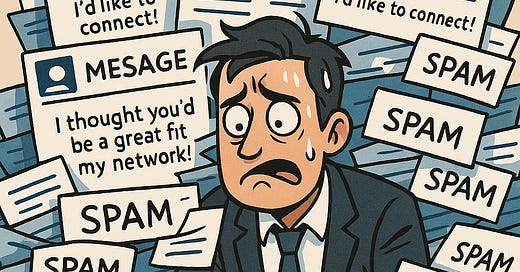


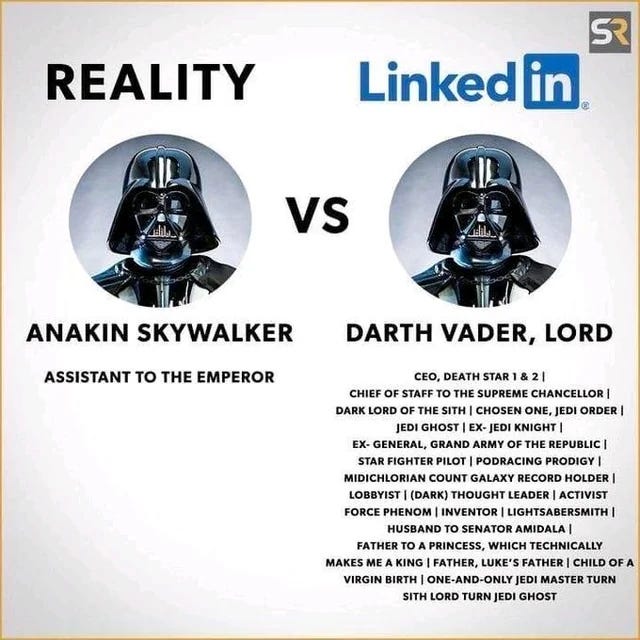
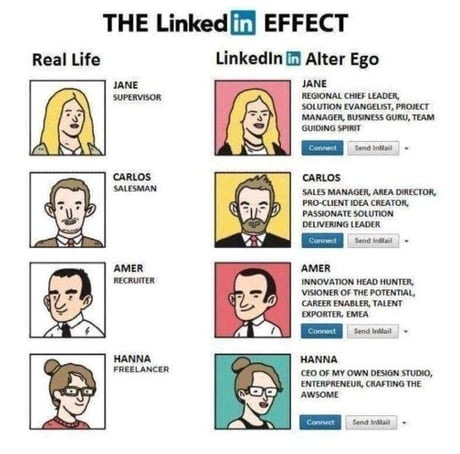


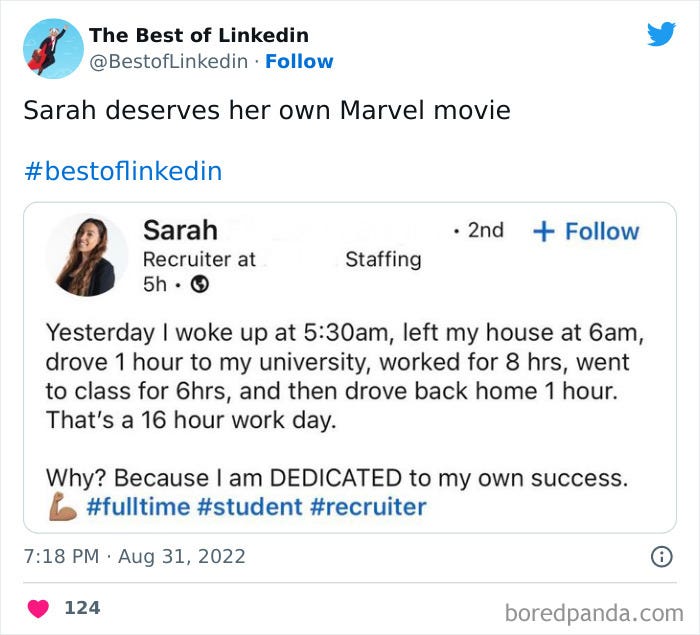
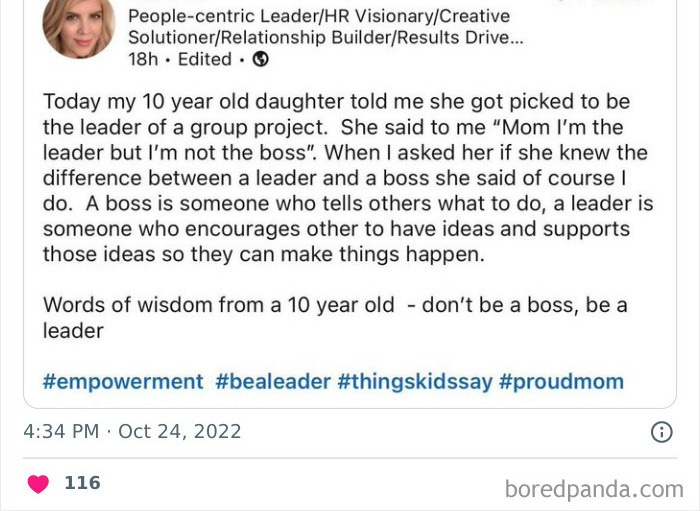
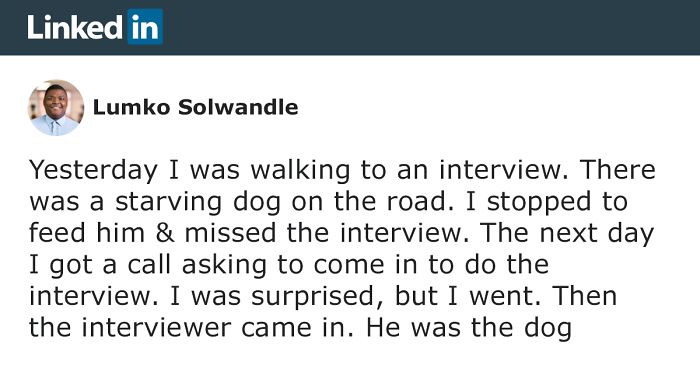
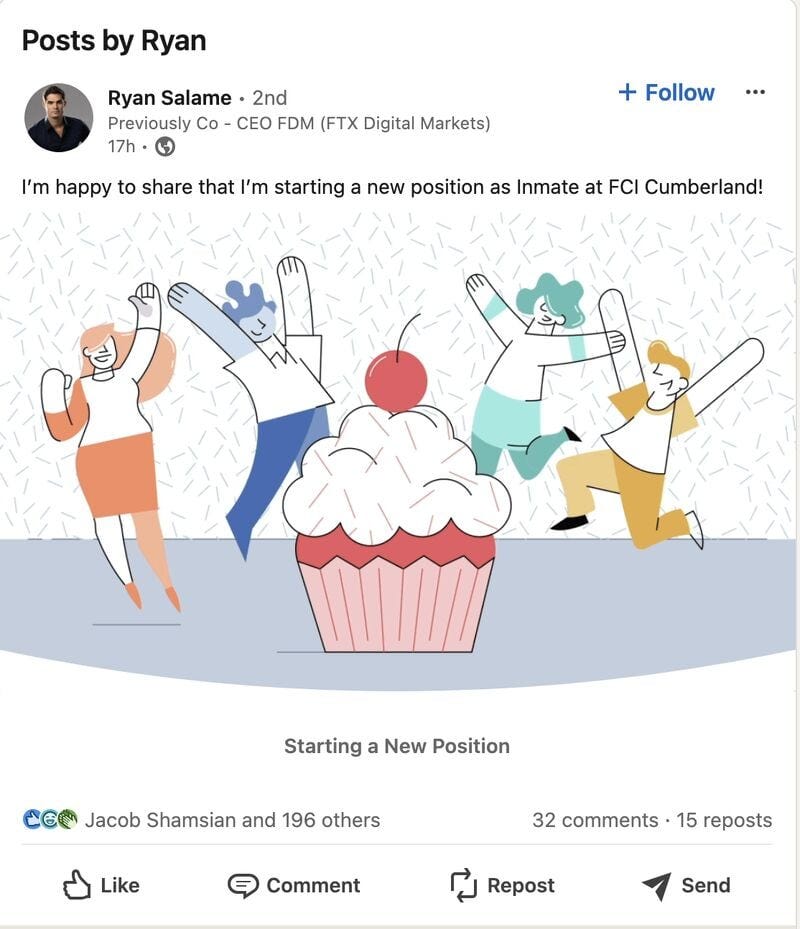
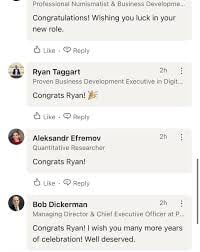
I phrase it slightly harsher, against living my best life according to the TED advisory committee:
Over 90% of recruiters rely on LinkedIn, yet only about .08% of applications lead to an offer. LinkedIn is phony ... a facade. LinkedIn is 4Chan for frightened would-be hires. A reverberating choir of HR-speak. Online dating for starry-eyed hopefuls. LinkedIn is a carnival of digitized corporate body odor illuminated by poorly balanced fluorescent light that somehow loves itself. LinkedIn drowns reality in a thick sea of forced positivity as cruel as Immortan Joe’s waterfall.
LinkedIn as much as any swampy region of the internet needs to be reconsidered or outright dropped. Good luck with that. Any expression sufficiently off course, such as this, is to behave excessively weird. To shout against the insane echoes of the platform is to toss one’s tiny fraction of a chance away. Good. The platform thrives off disorienting fear. It is a numbing assembly best for stagnating minds.
Really enjoyed this and laugh out loud several times as the examples are spot on! I only have LinkedIn because it's necessary to be seen in my line of work to be credible and that alone tells you how reliant we've become on thinking people with an online presence on the platform versus those without it as more trustworthy and professional. That of course doesn't mean we should blindly trust everything we see online and LinkedIn is a perfect example of it as it is fueled by people patting their own backs...